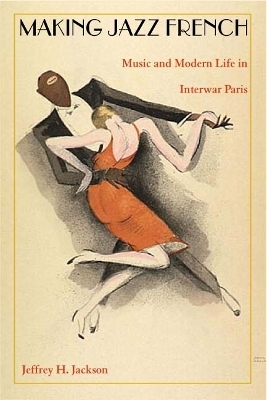
Making Jazz French
Music and Modern Life in Interwar Paris
Seiten
2003
Duke University Press (Verlag)
978-0-8223-3137-7 (ISBN)
Duke University Press (Verlag)
978-0-8223-3137-7 (ISBN)
- Titel z.Zt. nicht lieferbar
- Versandkostenfrei innerhalb Deutschlands
- Auch auf Rechnung
- Verfügbarkeit in der Filiale vor Ort prüfen
- Artikel merken
Between the world wars, Paris welcomed not only a number of glamorous American expatriates including Jospehine Baker and F Scott Fitzgerald, but also a dynamic musical style emerging in the United States: jazz. This title examines how and why jazz became so widely performed in Paris in the 1920s and 1930s and also why it was so controversial.
Between the world wars, Paris welcomed not only a number of glamorous American expatriates, including Josephine Baker and F. Scott Fitzgerald, but also a dynamic musical style emerging in the United States: jazz. Roaring through cabarets, music halls, and dance clubs, the upbeat, syncopated rhythms of jazz soon added to the allure of Paris as a center of international nightlife and cutting-edge modern culture. In Making Jazz French, Jeffrey H. Jackson examines not only how and why jazz became so widely performed in Paris during the 1920s and 1930s but also why it was so controversial.Drawing on memoirs, press accounts, and cultural criticism, Jackson uses the history of jazz in Paris to illuminate the challenges confounding French national identity during the interwar years. As he explains, many French people initially regarded jazz as alien because of its associations with America and Africa. Some reveled in its explosive energy and the exoticism of its racial connotations, while others saw it as a dangerous reversal of France’s most cherished notions of "civilization." At the same time, many French musicians, though not threatened by jazz as a musical style, feared their jobs would vanish with the arrival of American performers. By the 1930s, however, a core group of French fans, critics, and musicians had incorporated jazz into the French entertainment tradition. Today it is an integral part of Parisian musical performance. In showing how jazz became French, Jackson reveals some of the ways a musical form created in the United States became an international phenomenon and acquired new meanings unique to the places where it was heard and performed.
Between the world wars, Paris welcomed not only a number of glamorous American expatriates, including Josephine Baker and F. Scott Fitzgerald, but also a dynamic musical style emerging in the United States: jazz. Roaring through cabarets, music halls, and dance clubs, the upbeat, syncopated rhythms of jazz soon added to the allure of Paris as a center of international nightlife and cutting-edge modern culture. In Making Jazz French, Jeffrey H. Jackson examines not only how and why jazz became so widely performed in Paris during the 1920s and 1930s but also why it was so controversial.Drawing on memoirs, press accounts, and cultural criticism, Jackson uses the history of jazz in Paris to illuminate the challenges confounding French national identity during the interwar years. As he explains, many French people initially regarded jazz as alien because of its associations with America and Africa. Some reveled in its explosive energy and the exoticism of its racial connotations, while others saw it as a dangerous reversal of France’s most cherished notions of "civilization." At the same time, many French musicians, though not threatened by jazz as a musical style, feared their jobs would vanish with the arrival of American performers. By the 1930s, however, a core group of French fans, critics, and musicians had incorporated jazz into the French entertainment tradition. Today it is an integral part of Parisian musical performance. In showing how jazz became French, Jackson reveals some of the ways a musical form created in the United States became an international phenomenon and acquired new meanings unique to the places where it was heard and performed.
Jeffrey H. Jackson is Assistant Professor of History at Rhodes College.
Acknowledgments ix
Introduction 1
1 The Arrival of Jazz 13
2 The Spread of Jazz 34
3 Jazz and the City of Paris 52
4 The Meanings of Jazz: America, Negre, and Civilization 71
5 Making Jazz Familiar: Music Halls and the Avant-Garde 104
6 Making Jazz French: Parisian Musicians and Jazz Fans 123
7 New Bands and New Tensions: Jazz and the Labor Problem 143
8 The Discovery of Hot Jazz 154
9 Epilogue 191
Appendix: Histories of Jazz in Interwar France 205
Notes 211
Selected Bibliography 255
Index 261
| Reihe/Serie | American Encounters/Global Interactions |
|---|---|
| Zusatzinfo | 10 b&w photos |
| Verlagsort | North Carolina |
| Sprache | englisch |
| Gewicht | 499 g |
| Themenwelt | Kunst / Musik / Theater ► Musik ► Jazz / Blues |
| ISBN-10 | 0-8223-3137-3 / 0822331373 |
| ISBN-13 | 978-0-8223-3137-7 / 9780822331377 |
| Zustand | Neuware |
| Haben Sie eine Frage zum Produkt? |
Mehr entdecken
aus dem Bereich
aus dem Bereich
zur politischen Ästhetik des Jazz
Buch | Hardcover (2023)
Phillip Reclam (Verlag)
38,00 €
Die Geschichte des Jazz in Deutschland
Buch | Softcover (2021)
Reclam, Philipp (Verlag)
20,00 €


